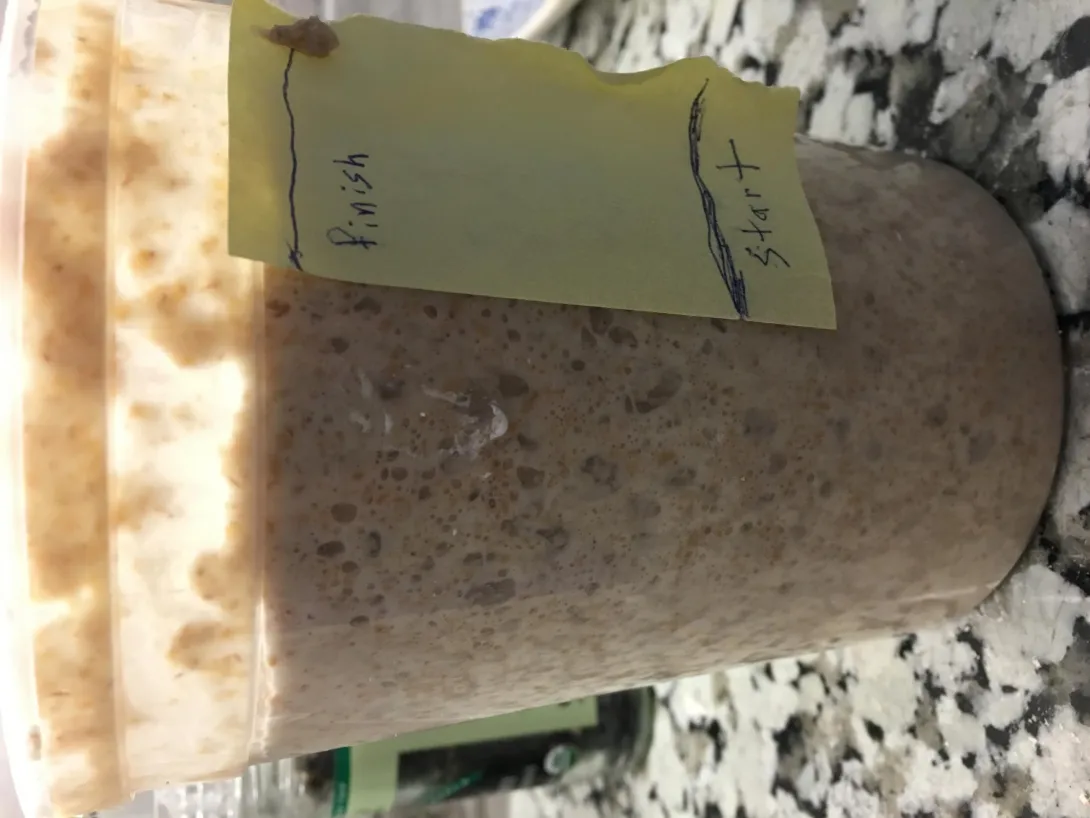
The short version: My healthy starter wont leaven my bread
Longer version: I used to bake sourdough bread with much success after reading the tartine book 1. I would usually use levain and poolish (wild starter and commercial yeast starter) and was cranking out beauties. After switching to levain only I had a couple loaves die on me. After giving up for a year, I've gone back and made a super healthy starter, from whole wheat / AP blend which more than doubles a 1cup flour+1/2 cup water+1/2 cup levain feeding in around 3.5 hours with those huge pockets of air, not just small bubbles.
I made a batch of dough with this recipe: 500g flour (2 cups AP+2 cups Whole wheat blend), 375g spring water (same as used for starter) 1/2 cup levain just at the end if it's rise, and 1/4 tsp salt w/iodide. The dough temp was 77F after mixing. The dough never got going, it's completely dead even after 4 hours of 'rising', it has no air bubbles at all, and based on experience it will only break down and get soupy as I keep letting it ferment, never getting sttong enough to shape. I will end up throwing the uncooked dough away after babying it for around a day.
What in the world is going on? I feed the starter alongside the dough, and the starter proofs up to over double size after 4 hours! Only idea I have is the salt, which I accidentally added at same time as levain, but it's happened before when I add salt 30 mins after adding levain. Should I switch to non-iodized sea salt? Should I cut out the salt altogether? Can anyone sympathize/help?
Here is my plan for tomorrow. I'll put together the same recipe, but this time I'll start by waiting much longer to add the salt. My starter doesn't usually start getting active till around the 1.5 hour mark. I'll wait to see sure signs of active fermentation from a 1 hour autolyse and maybe even a first fold, then add the salt. I'll post a progress report once I see what happens!
I suggest you use all weight measurements for your dough and switch to sea salt. So 500 g of flour (try 400 g all purpose and 100 g wholewheat), 350-375 g warm water and autolyse that for one hour. Start with more white flour and less water until you get the hang of this.
Then add 100 grams of your 6 hours old starter and 10 to 11 g of salt. Mix starter and salt in well by pinching as well as folding the dough. Let sit for a half hour in a warm spot (the oven with the light on and the door cracked open works well. I use a wooden spoon to hold the door open) and then give it four folds.
Repeat until the dough has risen 30 to 50%. This could take anywhere from 4 to 7 hours. If it is really warm, then it could be only 3 but too warm will kill the yeast so watch the temperature And the dough. My oven has dual lights so it gets too hot in there with the door completely closed. No matter the time, the dough will be ready when its ready. Experience will eventually let you know what to expect with your particular ingredients.
Then shape and proof.
Hope this helps.
is not long enough for the amount of starter. As you are comparing the starter rise with the dough rise be aware that your starter was fed not yet twice it's weight in flour, yet the dough is closer to one part levain to 5 or 6 parts flour. It takes time for the dough to build up enough yeast to compare to the starter.
Next time pinch off a piece of dough from the loaf and watch it in a tall narrow glass (covered) and then compare. It makes it easier to watch the bubbles forming if you can see them.
You might want to add more starter to the dough to speed it up. Try twice as much.
You might also want to try a 1 2 3 sourdough recipe for comparing. It gives about an 8 hour rise (total rise time) on the average. Your results may vary according to type of flour, temperature and strength of starter.
For example: One weight of starter (100g) + Two weights of water (200g) + Three weights of flour (300g) tweaking the water up or down + 2% salt on the flour weight (up to 7g salt)
If you have an ideal dough weight, just divide it by 6 to find out how much starter you need. 900g / 6 = 150g
Isn't that used as a sanitizer? What have you done to your bugs?!?
Give them every chance you can. I would think that your bugs would prefer salt without iodide.
slavicrye
I agree with everything she said.
The iodine in the salt should not influence the rise, I have used both, iodized salt and sea salt (which has naturally less iodine) - no difference.
Iodine is added to the salt to prevent hypothyroidism (goiter).
Karin